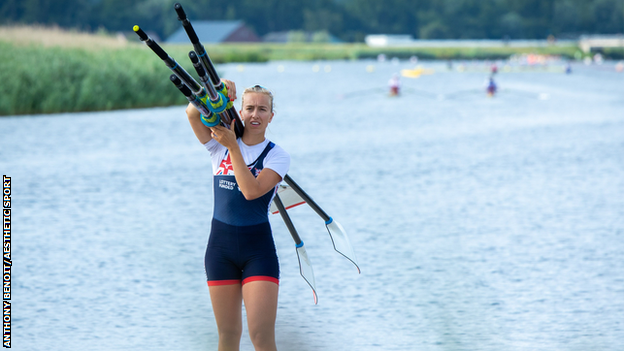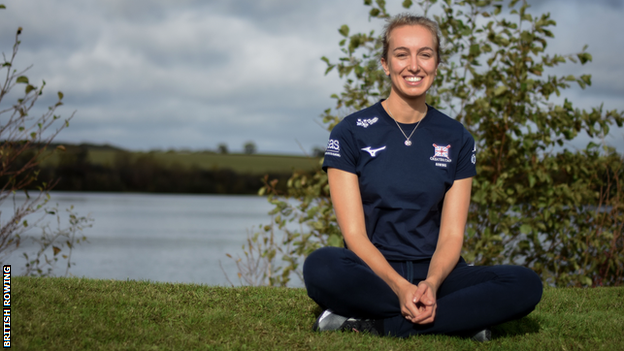Long Covid: Oonagh Cousins, GB rower, on the effects
- Published

Oonagh Cousins was provisionally selected in the Great Britain women's eight for the 2020 season before lockdown
Everyone has had to search for that glimmer of light in 2020, but Oonagh Cousins is one of those for whom it hasn't been easy to find.
Cousins could have been rowing at the Olympics this summer.
Instead, 'long Covid' - the term often used to explain lasting effects of Covid-19 - has had a debilitating effect on her body and mind, and though she is well on the road to recovery, a return to the water is some way off.
"There are times when I just feel like my body has let me down," she tells BBC Sport.
The lack of energy, the headaches, the nausea. For seven months, this 25-year-old - an athlete, a rower for Great Britain, remember - has navigated the ups and downs of the post-viral fatigue some develop after contracting coronavirus - a pandemic which has passed one million cases in the UK, with more than 47,000 deaths.
Cousins' initial symptoms when she got the virus in March weren't too bad. She had a cough and lost her sense of taste and smell, but has "had worse colds".
Those symptoms are long gone - but fatigue and brain fog remain. While that fog has lifted somewhat, and there are now far more good days than bad, she is unable to return to training.
"On the worst days you struggle to walk or cook a meal or compose an email," she says. "As time goes on, you are more able to see friends or go for a short jog.
"On the worst days you wake up, and you're like, 'I can't wait until it's night time again'.
"You don't want to get out of bed, you don't want to go and eat, you don't want to talk to your friends, you just want to stay in bed and hide under a rock.
"It's hard to talk about. But I want talk about it because I think there are people out there that will be experiencing the same."
This year had been shaping up to be a good one for Cousins. She had been selected in the GB women's eight, putting her in a good position to make her Olympic debut in Tokyo.
"It was such a whirlwind because I was quite new to the team and I haven't been selected before for a World Championship, so I didn't really know what my chances were coming into the year," she says.
"In that week we got selected, I realised I had Covid, the country went into lockdown and then a week later the Olympics were postponed.
"So mentally, with the amount of stuff going on, I don't think I fully processed everything and it's really quite weird to talk about because it feels like a bit of a dream."
Cousins first came down with a persistent cough in early March, but put it down to tiredness from intense training. She later lost her taste and smell.
She took a break from training, and then the country went into the first national lockdown. When the cough disappeared, Cousins was still far from full fitness. Maybe she missed the structure of training? Maybe it was because the Olympics had been postponed?
"Looking back it's just because I was really quite ill and didn't realise it," she says.
"I've felt a bit disconnected from my body almost because you just don't expect to be ill for this length of time.
"But there are also times when I feel a bit sorry for my body because it's obviously been through the wringer."
Rationally, Cousins says, it is the "fatigue speaking" but the "spiralling negative thoughts, lack of motivation for anything, and a complete absence of hope" are the parts of the illness she has struggled most with.
"It's really hard because it's just unlike anything I've had before," she says. "I'm quite positive person, I'm upbeat and I'm motivated, but when I have bad periods I do really lose myself and that's a tough headspace to be in."

Cousins has not yet been able to return to training
Cousins hasn't been alone. She is glad of the support she has had from British Rowing and counts herself as "lucky" - though admits it might not be the most suitable of words - her friend Ella Barnard, a club rower, also has post-viral fatigue.
They have been a great support for one another, but concede others might not have such help in place.
"We really feel like if there's anyone out there who doesn't realise what they have, it could be really dangerous for them and we just want to make them feel heard. We know what you're going through, you're not going crazy," Cousins says.
"Also, I do think a lot of young people think that they don't get Covid and if you're not vulnerable you'll be OK. I'm 25, I'm young, I was fit and healthy and I had it for seven months. It's a really horrible virus and it can affect anyone."
Though it's not linear, Cousins' recovery is moving in the right direction. She has attempted to return to steady training, but isn't quite ready for exercise yet.
As frustrating as it may be, she now realises the importance of listening to and trusting her body, and will give it the time it needs.
"I don't have a lot of resilience," she says. "I can do a little bit of daily activity - like I can go and see my friends or I can go to the shops or whatever - but exercise is different.
"There's no definitive timeline, but I need to have a period of time where I feel really good and almost to the point where I'm begging to go back to training before I can actually start training again because my body just needs to build up its resilience again."
As for next year's rearranged Olympics?
"I'm just focusing on my health and then we'll see how it goes."

Small Axe Trailer: Sneak peak of Steve McQueen's powerful new drama
